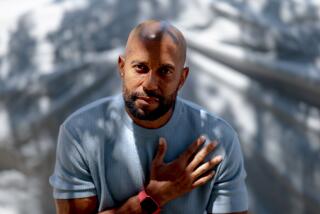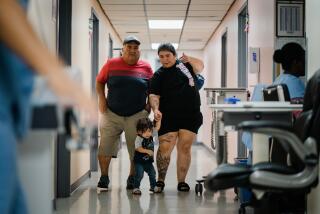Election may determine fate of sick, uninsured Americans
- Share via
MURFREESBORO, Tenn. — Jode Towe was driving his big rig across the New Mexico desert in April when he noticed an odd sensation at the back of his throat.
“It was like something was growing there,” he recalled.
When Towe, 41, went to a clinic, he got bad news. He might have cancer. Doctors recommended a biopsy. If the results confirmed their suspicions, surgery and chemotherapy might follow.
But Towe and his wife, who live in this small city near Nashville when they aren’t hauling freight across the country, don’t have health insurance. Nor do they have $4,000 for the tests to get an accurate diagnosis. For now, they’re waiting as the growth in Towe’s neck swells.
“I always worked hard. I never took it easy,” Towe said, his voice trailing off. “But they said I might die.”
Towe is one of nearly 50 million people in the United States who don’t have health coverage. Close to 30 million have been uninsured for at least a year, according to the Commonwealth Fund, a New York healthcare foundation.
Many of the uninsured are young, healthy or don’t want insurance. About one-fifth aren’t citizens. Millions, however, are like Towe: sick and unable to afford the medical care they need.
The fate of these Americans — at the heart of the nation’s tortured, decades-long debates over healthcare — is now bound up with the outcome of the presidential election.
President Obama’s healthcare law is scheduled to guarantee coverage to all Americans beginning in 2014, by prohibiting insurers from turning away sick customers like Towe.
But the law, which will subsidize insurance for millions, will be costly. The Republican nominee, former Massachusetts Gov. Mitt Romney, has pledged to repeal it, saying the law represents a “political philosophy … that government knows better than people how to run your lives.”
Romney has said that only Americans who currently have insurance should be guaranteed continued coverage if they change jobs or lose a job. That protection is already available for most workers under a 1996 law.
He and other Republicans promise to make health insurance less costly by deregulating it. Romney has not specified what would happen to people like Towe who don’t have insurance, though he has said it is a job for state governments.
Massachusetts is among several states that guarantee health coverage, with the help of additional federal aid, a plan signed by Romney when he was governor.
Tennessee used to do the same. But it became too expensive, and state leaders rolled back coverage.
Today, Tennessee runs a small health plan, known as AccessTN, for people with serious illnesses who can’t get private insurance. Romney has suggested such so-called high-risk pools as a tool for covering the chronically ill. But like similar pools around the country, premiums for the Tennessee plan are very high. Just 2,960 people are enrolled.
For Towe, an AccessTN plan with a $3,000 annual deductible would cost $516 a month, more than he can afford. Private insurers told him not to bother applying. Towe’s possible cancer is the kind of preexisting medical condition that most won’t cover.
At first, Towe and his wife panicked.
“I said, ‘This can’t be happening,’” said Yamira Towe, a native of Puerto Rico who met her husband at a trucking company in eastern Tennessee. “We just got married two years ago. I thought, ‘What am I going to do without him?’”
The Towes knew they were taking a risk when they left the company to start a business driving their own truck. Last year, the couple took home about $48,000, after expenses. Payments on the truck, including insurance and permits, total more than $28,000 a year.
Health insurance was out of the question, at least at first.
“Better not get sick,” Jode Towe figured.
Towe, who jokes he’s still a “strong buck,” had always been healthy. He loved sailing and flying airplanes. He’d run his own tree-cutting business. And he prided himself on being able to drive 700 miles in a day.
More recently, Towe couldn’t make the long drives without rest. That was worrisome.
The Towes were able to pay cash for the first round of doctor visits this spring: $80 for the first trip to the clinic, approximately $600 for two CT scans, $150 for a cardiologist visit.
The couple got a break on some bills. “The doctors were great,” Yamira Towe said.
But a biopsy and an operation to take out her husband’s tonsils probably would run $3,500 to $4,500. A round of chemotherapy, if that became necessary, could run more than $10,000.
She scrambled to find help. A benevolent fund the Towes contributed to at their former trucking company was reserved for current employees. She checked with the Leukemia & Lymphoma Society and the American Cancer Society, but they couldn’t help.
The cancer society’s cancer action network, after being contacted for an article about uninsured people, put The Times in touch with Jode Towe.
If Towe becomes very ill, he could go to an emergency room. A hospital would be required by federal law to stabilize him. But hospitals are not required to provide ongoing treatment. Towe would also be billed for any services the ER provides.
For now, Towe doesn’t have a life-threatening emergency.
“There is really nowhere we can go,” his wife said.
Nationwide, more than a quarter of non-elderly adults without insurance — about 10 million people — went without needed medical care in the previous year, according to the Kaiser Commission on Medicaid and the Uninsured. Just 4% of those with private insurance skip needed care.
Towe’s decision was risky. Delaying diagnosis and treatment for many cancers can make the disease more difficult to treat.
“It scares the hell out of me,” Towe confessed. The couple had hoped Towe could get surgery this fall if they made enough runs over the summer to build up their savings.
But it didn’t work out that way. The rig broke down in July, requiring $2,000 in repairs. That meant two weeks without income. This month, the truck broke down again. They’re behind on their rent and still haven’t banked any money for Towe’s surgery.
The Towes are trying to keep their hopes up. “They tell me mind over matter heals the body. I figure, let’s not really think about it and see if it does,” Towe said, chuckling. “I’ll try anything, because I’m sure not getting any insurance.”
Lately, he’s tried to keep his mind focused on things he’d like to do in the future, such as build boats and paint landscapes again. “I’ve got a lot of things I want to accomplish,” he said.
But Towe doesn’t know if he’ll get the chance. “Most things in my life, I’ve been able to come up with a plan,” he said. “This one, I’m just not sure.”







